Contract Law Case Study: Restaurant, Wedding, and Mistakes
VerifiedAdded on 2022/09/30
|9
|1974
|222
Case Study
AI Summary
This case study delves into a contract law dispute centered around a restaurant and a customer's wedding booking. The analysis begins by examining the formation of a valid contract, outlining the essential elements such as agreement, consideration, intention, and legal object. It then investigates a scenario where a unilateral mistake occurs due to price discrepancies between the restaurant's website and menu card, evaluating the potential for the contract to be voided or set aside. Finally, the case study addresses the consequences of the restaurant's failure to provide the premises for the wedding, assessing the breach of contract and the damages that the customer may be entitled to, considering causation, remoteness, and mitigation of loss. The analysis draws upon relevant case law to support its conclusions.
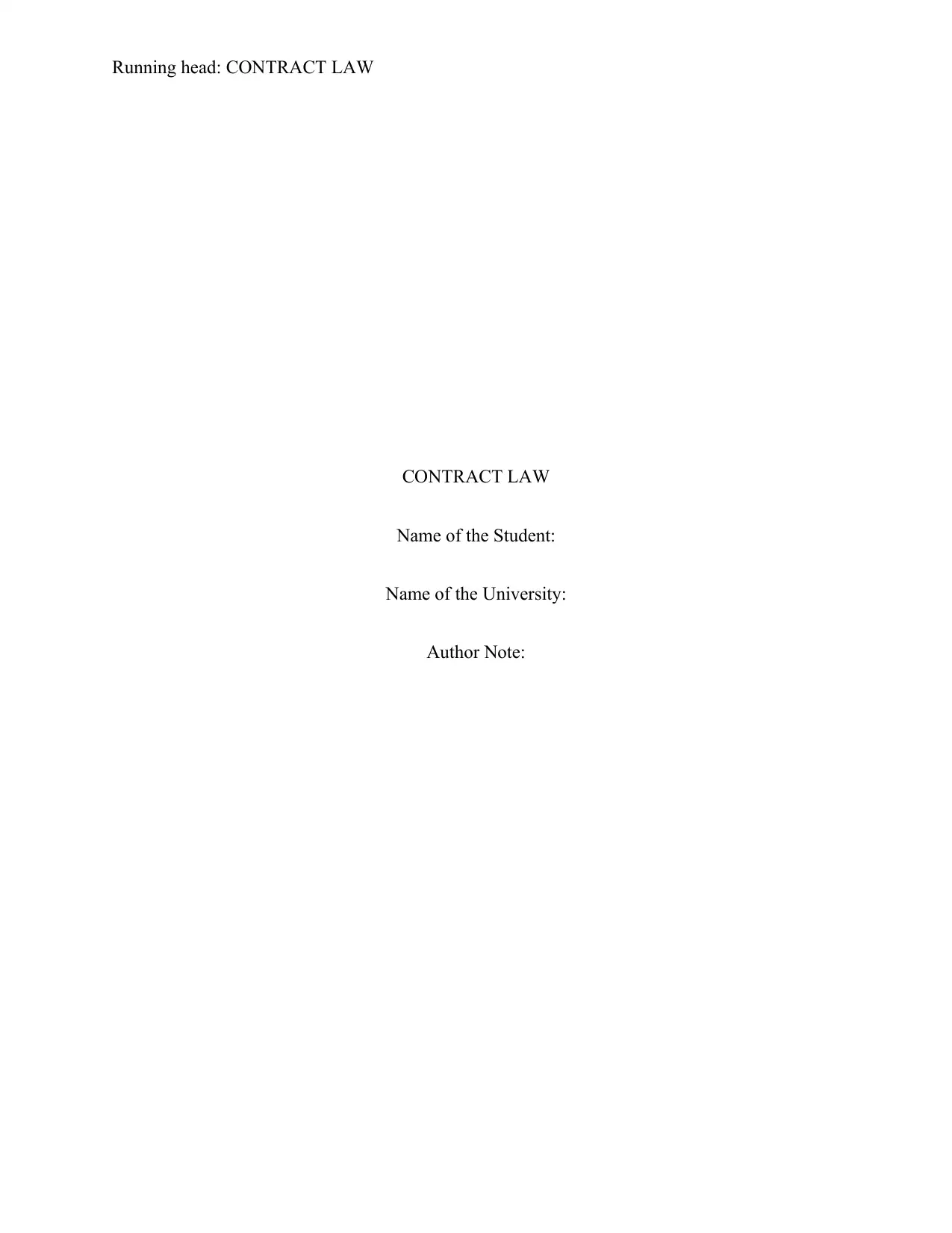
Running head: CONTRACT LAW
CONTRACT LAW
Name of the Student:
Name of the University:
Author Note:
CONTRACT LAW
Name of the Student:
Name of the University:
Author Note:
Paraphrase This Document
Need a fresh take? Get an instant paraphrase of this document with our AI Paraphraser
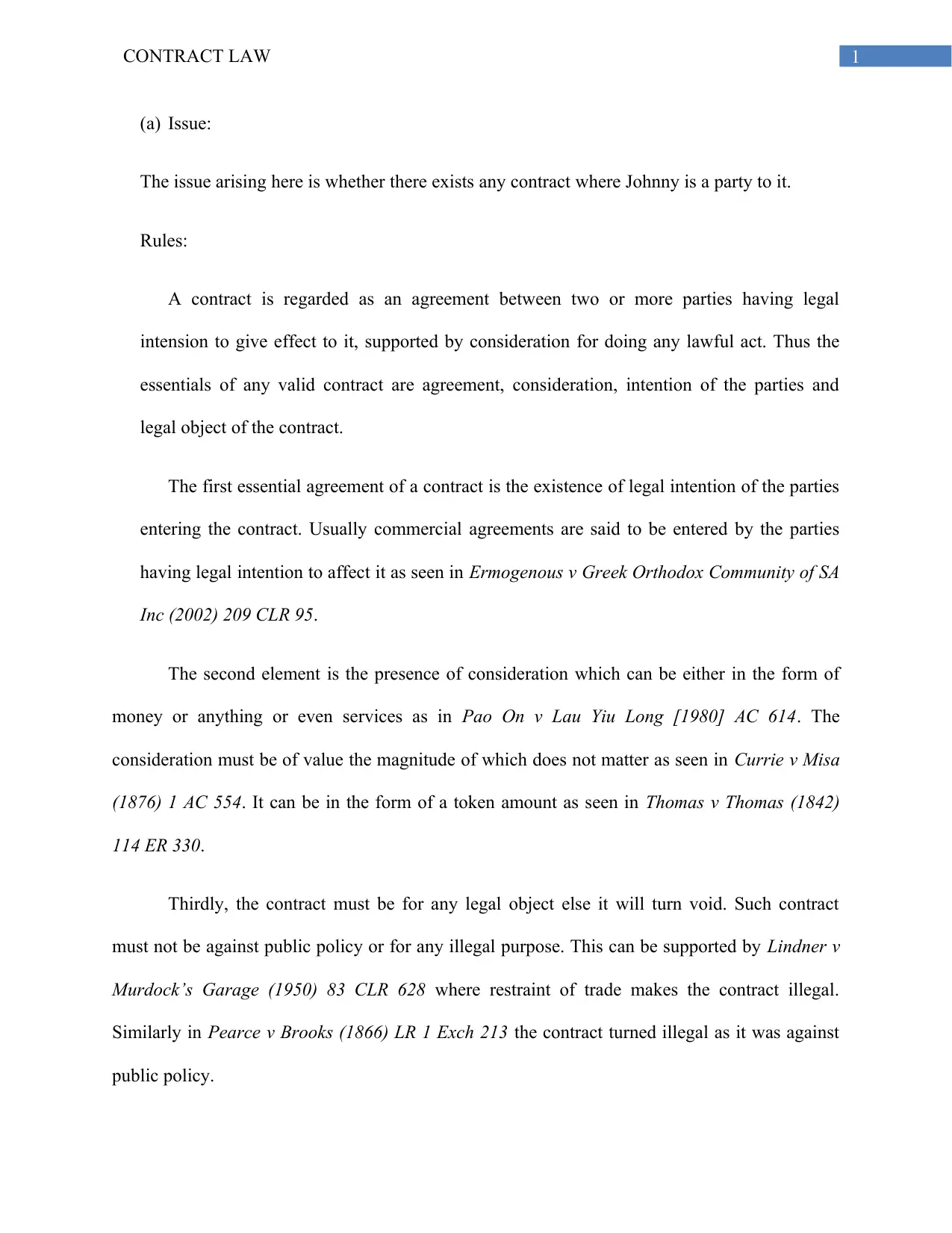
1CONTRACT LAW
(a) Issue:
The issue arising here is whether there exists any contract where Johnny is a party to it.
Rules:
A contract is regarded as an agreement between two or more parties having legal
intension to give effect to it, supported by consideration for doing any lawful act. Thus the
essentials of any valid contract are agreement, consideration, intention of the parties and
legal object of the contract.
The first essential agreement of a contract is the existence of legal intention of the parties
entering the contract. Usually commercial agreements are said to be entered by the parties
having legal intention to affect it as seen in Ermogenous v Greek Orthodox Community of SA
Inc (2002) 209 CLR 95.
The second element is the presence of consideration which can be either in the form of
money or anything or even services as in Pao On v Lau Yiu Long [1980] AC 614. The
consideration must be of value the magnitude of which does not matter as seen in Currie v Misa
(1876) 1 AC 554. It can be in the form of a token amount as seen in Thomas v Thomas (1842)
114 ER 330.
Thirdly, the contract must be for any legal object else it will turn void. Such contract
must not be against public policy or for any illegal purpose. This can be supported by Lindner v
Murdock’s Garage (1950) 83 CLR 628 where restraint of trade makes the contract illegal.
Similarly in Pearce v Brooks (1866) LR 1 Exch 213 the contract turned illegal as it was against
public policy.
(a) Issue:
The issue arising here is whether there exists any contract where Johnny is a party to it.
Rules:
A contract is regarded as an agreement between two or more parties having legal
intension to give effect to it, supported by consideration for doing any lawful act. Thus the
essentials of any valid contract are agreement, consideration, intention of the parties and
legal object of the contract.
The first essential agreement of a contract is the existence of legal intention of the parties
entering the contract. Usually commercial agreements are said to be entered by the parties
having legal intention to affect it as seen in Ermogenous v Greek Orthodox Community of SA
Inc (2002) 209 CLR 95.
The second element is the presence of consideration which can be either in the form of
money or anything or even services as in Pao On v Lau Yiu Long [1980] AC 614. The
consideration must be of value the magnitude of which does not matter as seen in Currie v Misa
(1876) 1 AC 554. It can be in the form of a token amount as seen in Thomas v Thomas (1842)
114 ER 330.
Thirdly, the contract must be for any legal object else it will turn void. Such contract
must not be against public policy or for any illegal purpose. This can be supported by Lindner v
Murdock’s Garage (1950) 83 CLR 628 where restraint of trade makes the contract illegal.
Similarly in Pearce v Brooks (1866) LR 1 Exch 213 the contract turned illegal as it was against
public policy.
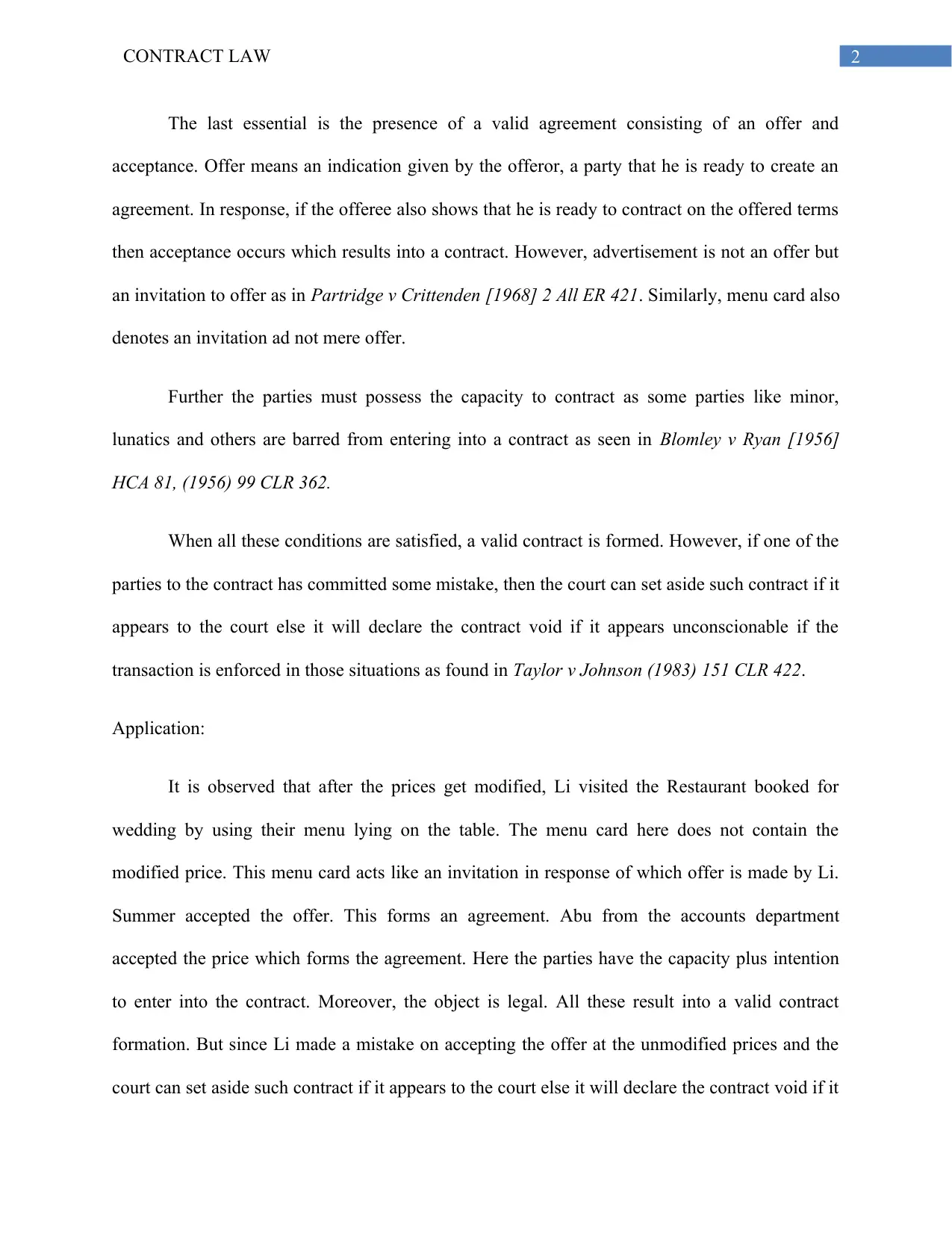
2CONTRACT LAW
The last essential is the presence of a valid agreement consisting of an offer and
acceptance. Offer means an indication given by the offeror, a party that he is ready to create an
agreement. In response, if the offeree also shows that he is ready to contract on the offered terms
then acceptance occurs which results into a contract. However, advertisement is not an offer but
an invitation to offer as in Partridge v Crittenden [1968] 2 All ER 421. Similarly, menu card also
denotes an invitation ad not mere offer.
Further the parties must possess the capacity to contract as some parties like minor,
lunatics and others are barred from entering into a contract as seen in Blomley v Ryan [1956]
HCA 81, (1956) 99 CLR 362.
When all these conditions are satisfied, a valid contract is formed. However, if one of the
parties to the contract has committed some mistake, then the court can set aside such contract if it
appears to the court else it will declare the contract void if it appears unconscionable if the
transaction is enforced in those situations as found in Taylor v Johnson (1983) 151 CLR 422.
Application:
It is observed that after the prices get modified, Li visited the Restaurant booked for
wedding by using their menu lying on the table. The menu card here does not contain the
modified price. This menu card acts like an invitation in response of which offer is made by Li.
Summer accepted the offer. This forms an agreement. Abu from the accounts department
accepted the price which forms the agreement. Here the parties have the capacity plus intention
to enter into the contract. Moreover, the object is legal. All these result into a valid contract
formation. But since Li made a mistake on accepting the offer at the unmodified prices and the
court can set aside such contract if it appears to the court else it will declare the contract void if it
The last essential is the presence of a valid agreement consisting of an offer and
acceptance. Offer means an indication given by the offeror, a party that he is ready to create an
agreement. In response, if the offeree also shows that he is ready to contract on the offered terms
then acceptance occurs which results into a contract. However, advertisement is not an offer but
an invitation to offer as in Partridge v Crittenden [1968] 2 All ER 421. Similarly, menu card also
denotes an invitation ad not mere offer.
Further the parties must possess the capacity to contract as some parties like minor,
lunatics and others are barred from entering into a contract as seen in Blomley v Ryan [1956]
HCA 81, (1956) 99 CLR 362.
When all these conditions are satisfied, a valid contract is formed. However, if one of the
parties to the contract has committed some mistake, then the court can set aside such contract if it
appears to the court else it will declare the contract void if it appears unconscionable if the
transaction is enforced in those situations as found in Taylor v Johnson (1983) 151 CLR 422.
Application:
It is observed that after the prices get modified, Li visited the Restaurant booked for
wedding by using their menu lying on the table. The menu card here does not contain the
modified price. This menu card acts like an invitation in response of which offer is made by Li.
Summer accepted the offer. This forms an agreement. Abu from the accounts department
accepted the price which forms the agreement. Here the parties have the capacity plus intention
to enter into the contract. Moreover, the object is legal. All these result into a valid contract
formation. But since Li made a mistake on accepting the offer at the unmodified prices and the
court can set aside such contract if it appears to the court else it will declare the contract void if it
⊘ This is a preview!⊘
Do you want full access?
Subscribe today to unlock all pages.

Trusted by 1+ million students worldwide
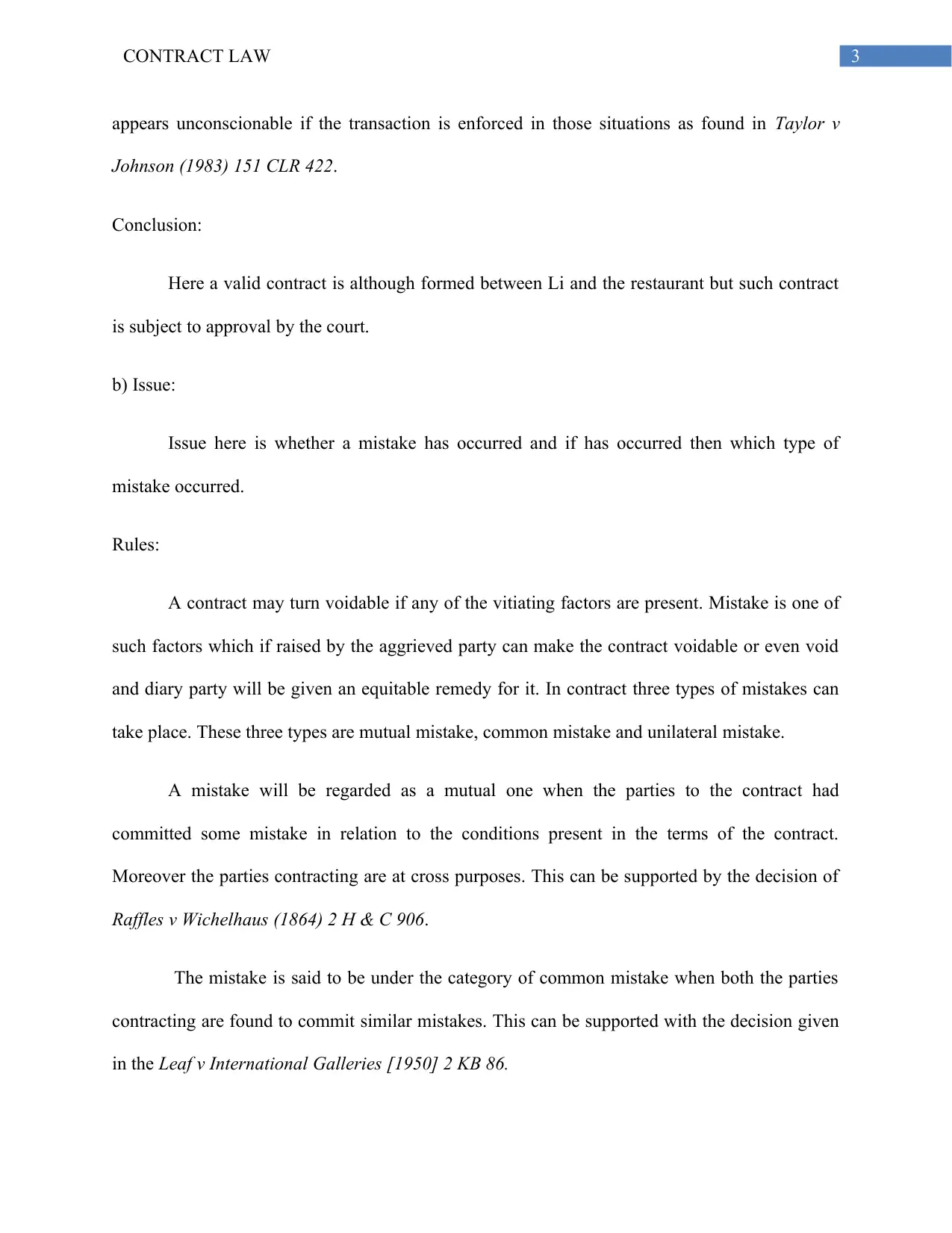
3CONTRACT LAW
appears unconscionable if the transaction is enforced in those situations as found in Taylor v
Johnson (1983) 151 CLR 422.
Conclusion:
Here a valid contract is although formed between Li and the restaurant but such contract
is subject to approval by the court.
b) Issue:
Issue here is whether a mistake has occurred and if has occurred then which type of
mistake occurred.
Rules:
A contract may turn voidable if any of the vitiating factors are present. Mistake is one of
such factors which if raised by the aggrieved party can make the contract voidable or even void
and diary party will be given an equitable remedy for it. In contract three types of mistakes can
take place. These three types are mutual mistake, common mistake and unilateral mistake.
A mistake will be regarded as a mutual one when the parties to the contract had
committed some mistake in relation to the conditions present in the terms of the contract.
Moreover the parties contracting are at cross purposes. This can be supported by the decision of
Raffles v Wichelhaus (1864) 2 H & C 906.
The mistake is said to be under the category of common mistake when both the parties
contracting are found to commit similar mistakes. This can be supported with the decision given
in the Leaf v International Galleries [1950] 2 KB 86.
appears unconscionable if the transaction is enforced in those situations as found in Taylor v
Johnson (1983) 151 CLR 422.
Conclusion:
Here a valid contract is although formed between Li and the restaurant but such contract
is subject to approval by the court.
b) Issue:
Issue here is whether a mistake has occurred and if has occurred then which type of
mistake occurred.
Rules:
A contract may turn voidable if any of the vitiating factors are present. Mistake is one of
such factors which if raised by the aggrieved party can make the contract voidable or even void
and diary party will be given an equitable remedy for it. In contract three types of mistakes can
take place. These three types are mutual mistake, common mistake and unilateral mistake.
A mistake will be regarded as a mutual one when the parties to the contract had
committed some mistake in relation to the conditions present in the terms of the contract.
Moreover the parties contracting are at cross purposes. This can be supported by the decision of
Raffles v Wichelhaus (1864) 2 H & C 906.
The mistake is said to be under the category of common mistake when both the parties
contracting are found to commit similar mistakes. This can be supported with the decision given
in the Leaf v International Galleries [1950] 2 KB 86.
Paraphrase This Document
Need a fresh take? Get an instant paraphrase of this document with our AI Paraphraser
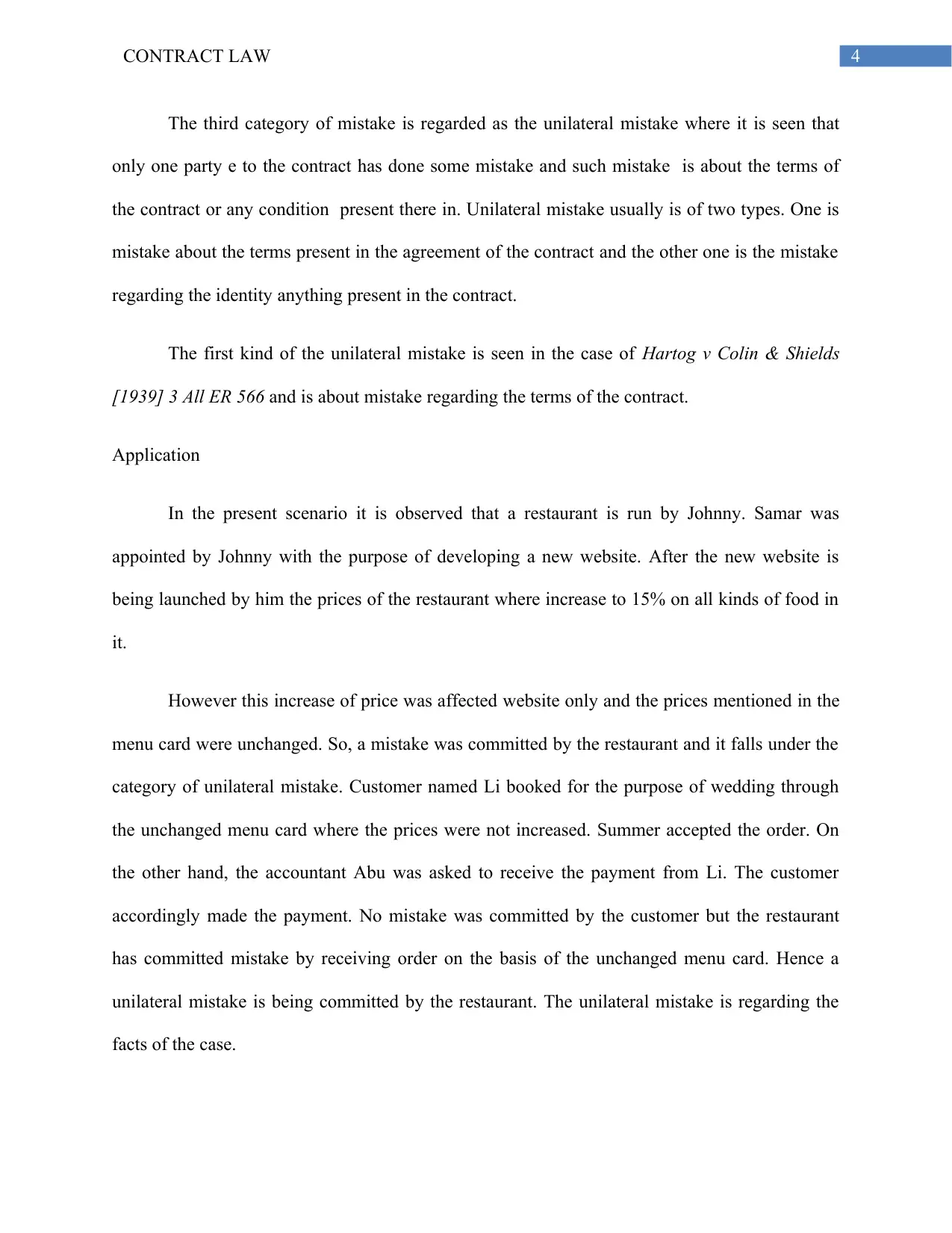
4CONTRACT LAW
The third category of mistake is regarded as the unilateral mistake where it is seen that
only one party e to the contract has done some mistake and such mistake is about the terms of
the contract or any condition present there in. Unilateral mistake usually is of two types. One is
mistake about the terms present in the agreement of the contract and the other one is the mistake
regarding the identity anything present in the contract.
The first kind of the unilateral mistake is seen in the case of Hartog v Colin & Shields
[1939] 3 All ER 566 and is about mistake regarding the terms of the contract.
Application
In the present scenario it is observed that a restaurant is run by Johnny. Samar was
appointed by Johnny with the purpose of developing a new website. After the new website is
being launched by him the prices of the restaurant where increase to 15% on all kinds of food in
it.
However this increase of price was affected website only and the prices mentioned in the
menu card were unchanged. So, a mistake was committed by the restaurant and it falls under the
category of unilateral mistake. Customer named Li booked for the purpose of wedding through
the unchanged menu card where the prices were not increased. Summer accepted the order. On
the other hand, the accountant Abu was asked to receive the payment from Li. The customer
accordingly made the payment. No mistake was committed by the customer but the restaurant
has committed mistake by receiving order on the basis of the unchanged menu card. Hence a
unilateral mistake is being committed by the restaurant. The unilateral mistake is regarding the
facts of the case.
The third category of mistake is regarded as the unilateral mistake where it is seen that
only one party e to the contract has done some mistake and such mistake is about the terms of
the contract or any condition present there in. Unilateral mistake usually is of two types. One is
mistake about the terms present in the agreement of the contract and the other one is the mistake
regarding the identity anything present in the contract.
The first kind of the unilateral mistake is seen in the case of Hartog v Colin & Shields
[1939] 3 All ER 566 and is about mistake regarding the terms of the contract.
Application
In the present scenario it is observed that a restaurant is run by Johnny. Samar was
appointed by Johnny with the purpose of developing a new website. After the new website is
being launched by him the prices of the restaurant where increase to 15% on all kinds of food in
it.
However this increase of price was affected website only and the prices mentioned in the
menu card were unchanged. So, a mistake was committed by the restaurant and it falls under the
category of unilateral mistake. Customer named Li booked for the purpose of wedding through
the unchanged menu card where the prices were not increased. Summer accepted the order. On
the other hand, the accountant Abu was asked to receive the payment from Li. The customer
accordingly made the payment. No mistake was committed by the customer but the restaurant
has committed mistake by receiving order on the basis of the unchanged menu card. Hence a
unilateral mistake is being committed by the restaurant. The unilateral mistake is regarding the
facts of the case.
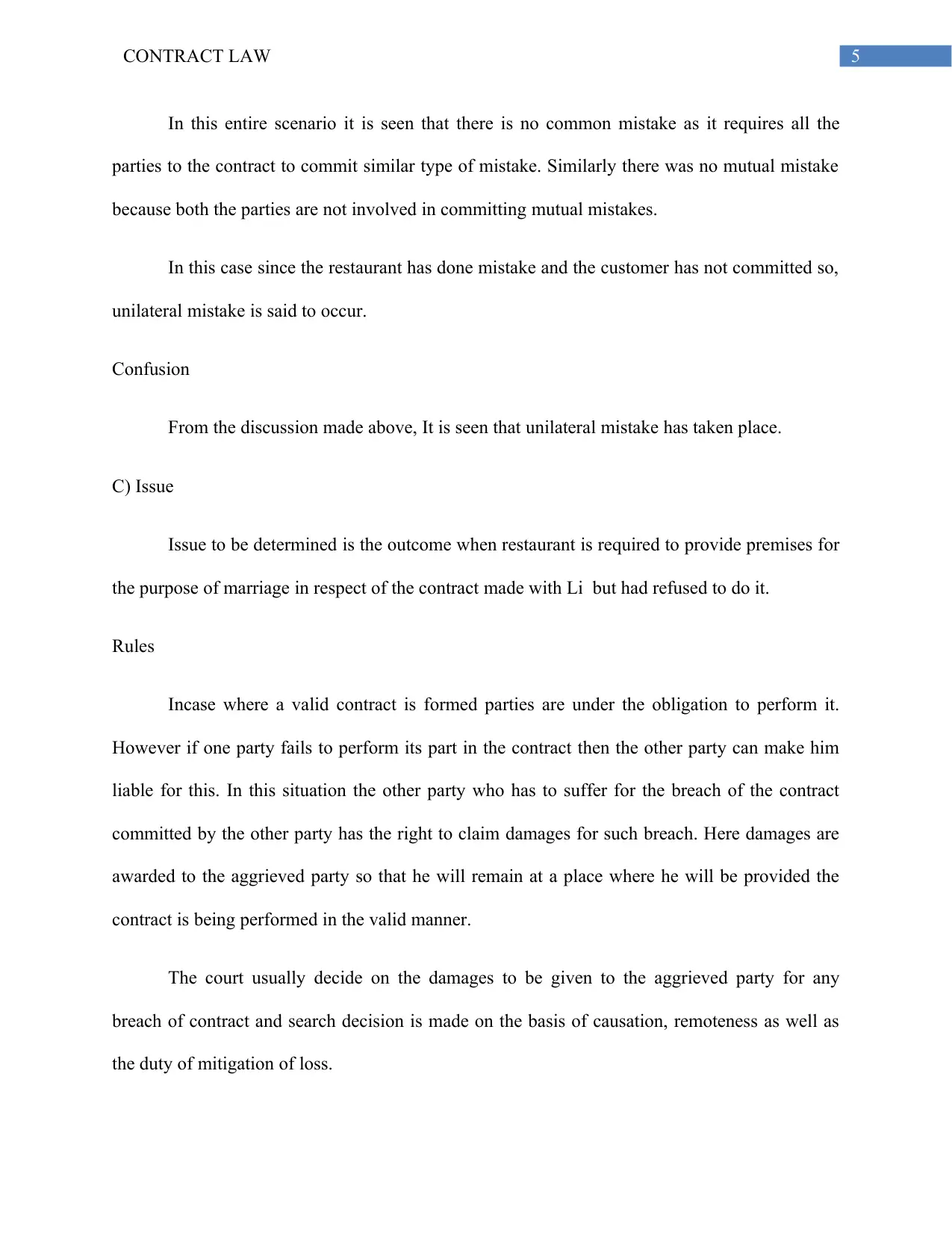
5CONTRACT LAW
In this entire scenario it is seen that there is no common mistake as it requires all the
parties to the contract to commit similar type of mistake. Similarly there was no mutual mistake
because both the parties are not involved in committing mutual mistakes.
In this case since the restaurant has done mistake and the customer has not committed so,
unilateral mistake is said to occur.
Confusion
From the discussion made above, It is seen that unilateral mistake has taken place.
C) Issue
Issue to be determined is the outcome when restaurant is required to provide premises for
the purpose of marriage in respect of the contract made with Li but had refused to do it.
Rules
Incase where a valid contract is formed parties are under the obligation to perform it.
However if one party fails to perform its part in the contract then the other party can make him
liable for this. In this situation the other party who has to suffer for the breach of the contract
committed by the other party has the right to claim damages for such breach. Here damages are
awarded to the aggrieved party so that he will remain at a place where he will be provided the
contract is being performed in the valid manner.
The court usually decide on the damages to be given to the aggrieved party for any
breach of contract and search decision is made on the basis of causation, remoteness as well as
the duty of mitigation of loss.
In this entire scenario it is seen that there is no common mistake as it requires all the
parties to the contract to commit similar type of mistake. Similarly there was no mutual mistake
because both the parties are not involved in committing mutual mistakes.
In this case since the restaurant has done mistake and the customer has not committed so,
unilateral mistake is said to occur.
Confusion
From the discussion made above, It is seen that unilateral mistake has taken place.
C) Issue
Issue to be determined is the outcome when restaurant is required to provide premises for
the purpose of marriage in respect of the contract made with Li but had refused to do it.
Rules
Incase where a valid contract is formed parties are under the obligation to perform it.
However if one party fails to perform its part in the contract then the other party can make him
liable for this. In this situation the other party who has to suffer for the breach of the contract
committed by the other party has the right to claim damages for such breach. Here damages are
awarded to the aggrieved party so that he will remain at a place where he will be provided the
contract is being performed in the valid manner.
The court usually decide on the damages to be given to the aggrieved party for any
breach of contract and search decision is made on the basis of causation, remoteness as well as
the duty of mitigation of loss.
⊘ This is a preview!⊘
Do you want full access?
Subscribe today to unlock all pages.

Trusted by 1+ million students worldwide
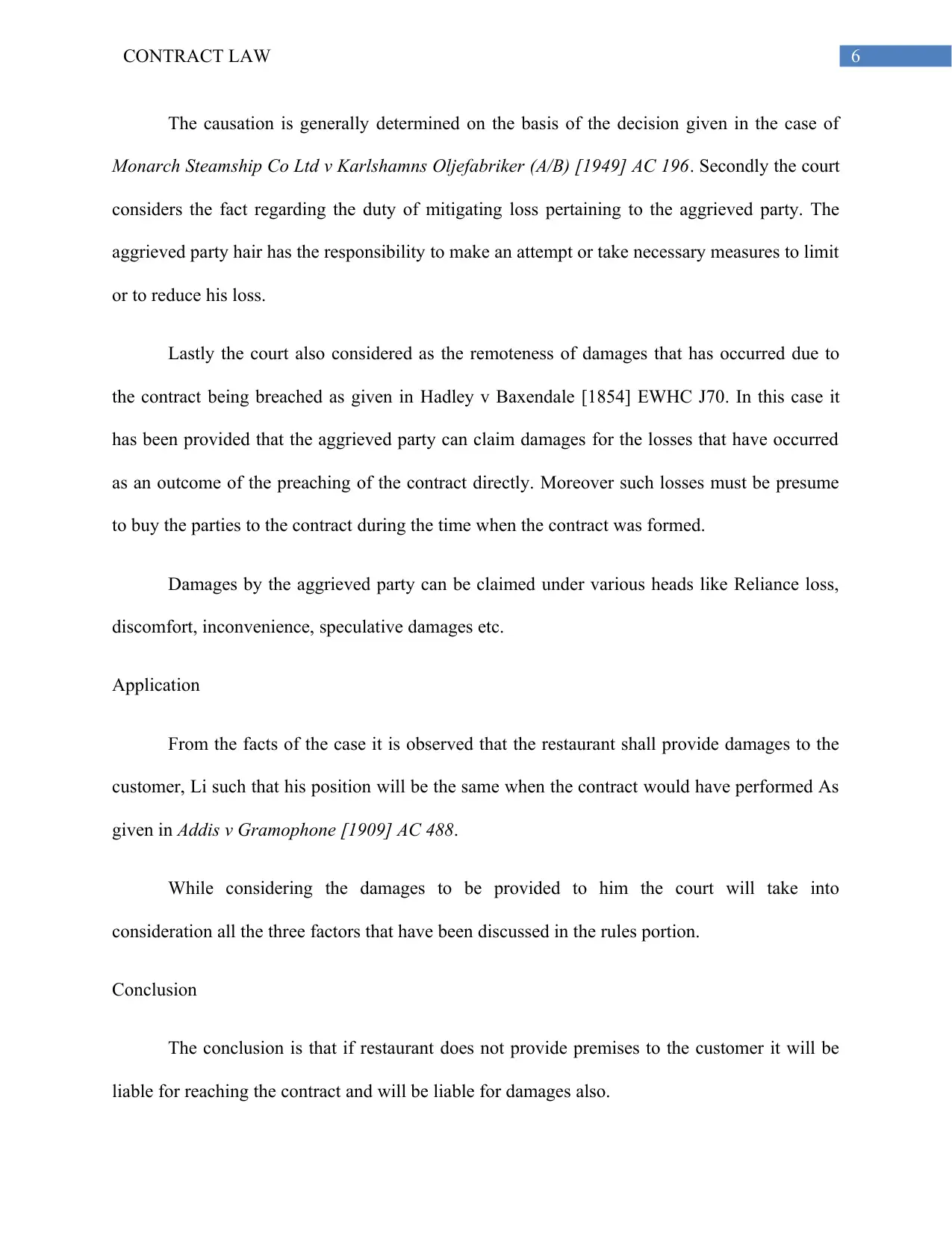
6CONTRACT LAW
The causation is generally determined on the basis of the decision given in the case of
Monarch Steamship Co Ltd v Karlshamns Oljefabriker (A/B) [1949] AC 196. Secondly the court
considers the fact regarding the duty of mitigating loss pertaining to the aggrieved party. The
aggrieved party hair has the responsibility to make an attempt or take necessary measures to limit
or to reduce his loss.
Lastly the court also considered as the remoteness of damages that has occurred due to
the contract being breached as given in Hadley v Baxendale [1854] EWHC J70. In this case it
has been provided that the aggrieved party can claim damages for the losses that have occurred
as an outcome of the preaching of the contract directly. Moreover such losses must be presume
to buy the parties to the contract during the time when the contract was formed.
Damages by the aggrieved party can be claimed under various heads like Reliance loss,
discomfort, inconvenience, speculative damages etc.
Application
From the facts of the case it is observed that the restaurant shall provide damages to the
customer, Li such that his position will be the same when the contract would have performed As
given in Addis v Gramophone [1909] AC 488.
While considering the damages to be provided to him the court will take into
consideration all the three factors that have been discussed in the rules portion.
Conclusion
The conclusion is that if restaurant does not provide premises to the customer it will be
liable for reaching the contract and will be liable for damages also.
The causation is generally determined on the basis of the decision given in the case of
Monarch Steamship Co Ltd v Karlshamns Oljefabriker (A/B) [1949] AC 196. Secondly the court
considers the fact regarding the duty of mitigating loss pertaining to the aggrieved party. The
aggrieved party hair has the responsibility to make an attempt or take necessary measures to limit
or to reduce his loss.
Lastly the court also considered as the remoteness of damages that has occurred due to
the contract being breached as given in Hadley v Baxendale [1854] EWHC J70. In this case it
has been provided that the aggrieved party can claim damages for the losses that have occurred
as an outcome of the preaching of the contract directly. Moreover such losses must be presume
to buy the parties to the contract during the time when the contract was formed.
Damages by the aggrieved party can be claimed under various heads like Reliance loss,
discomfort, inconvenience, speculative damages etc.
Application
From the facts of the case it is observed that the restaurant shall provide damages to the
customer, Li such that his position will be the same when the contract would have performed As
given in Addis v Gramophone [1909] AC 488.
While considering the damages to be provided to him the court will take into
consideration all the three factors that have been discussed in the rules portion.
Conclusion
The conclusion is that if restaurant does not provide premises to the customer it will be
liable for reaching the contract and will be liable for damages also.
Paraphrase This Document
Need a fresh take? Get an instant paraphrase of this document with our AI Paraphraser
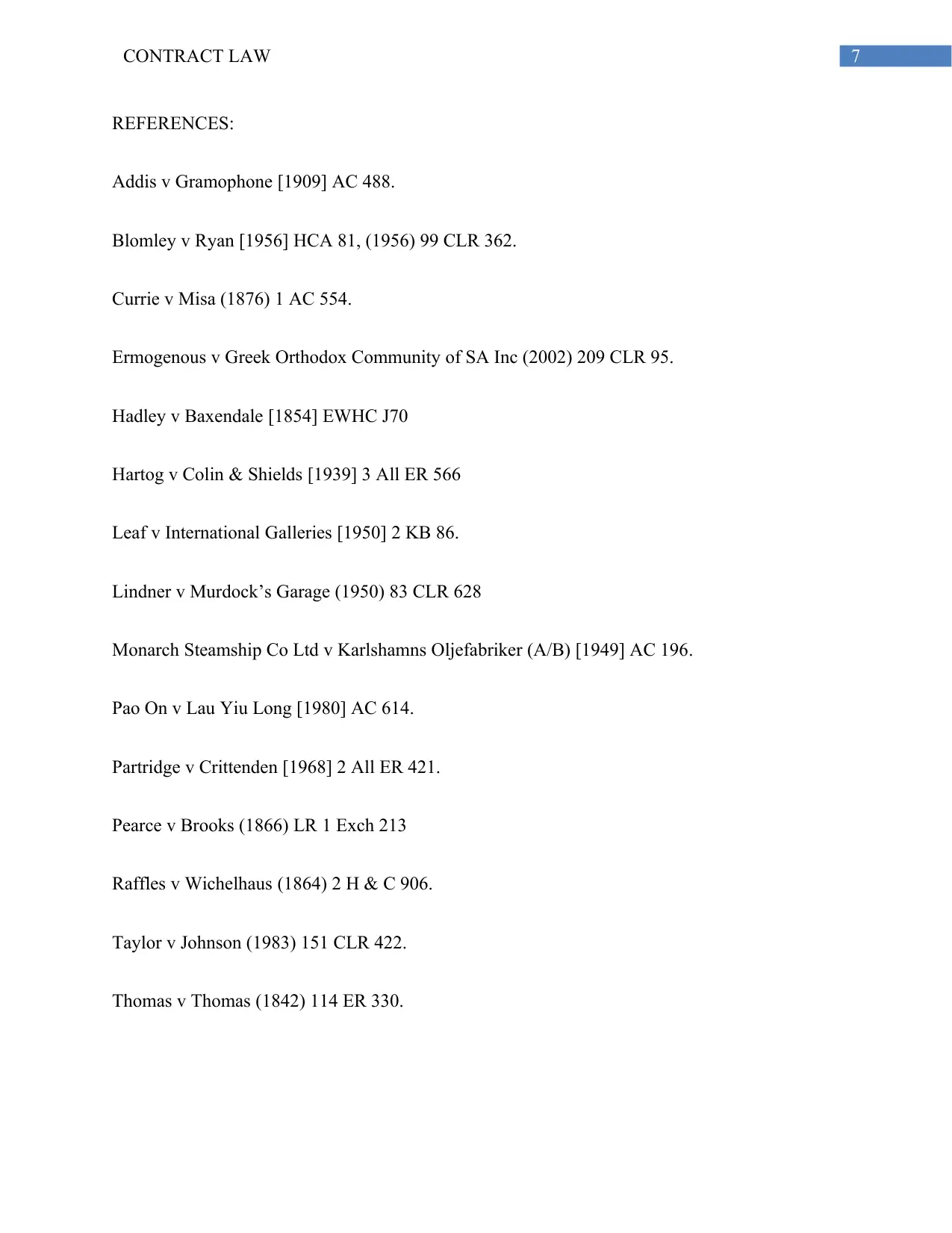
7CONTRACT LAW
REFERENCES:
Addis v Gramophone [1909] AC 488.
Blomley v Ryan [1956] HCA 81, (1956) 99 CLR 362.
Currie v Misa (1876) 1 AC 554.
Ermogenous v Greek Orthodox Community of SA Inc (2002) 209 CLR 95.
Hadley v Baxendale [1854] EWHC J70
Hartog v Colin & Shields [1939] 3 All ER 566
Leaf v International Galleries [1950] 2 KB 86.
Lindner v Murdock’s Garage (1950) 83 CLR 628
Monarch Steamship Co Ltd v Karlshamns Oljefabriker (A/B) [1949] AC 196.
Pao On v Lau Yiu Long [1980] AC 614.
Partridge v Crittenden [1968] 2 All ER 421.
Pearce v Brooks (1866) LR 1 Exch 213
Raffles v Wichelhaus (1864) 2 H & C 906.
Taylor v Johnson (1983) 151 CLR 422.
Thomas v Thomas (1842) 114 ER 330.
REFERENCES:
Addis v Gramophone [1909] AC 488.
Blomley v Ryan [1956] HCA 81, (1956) 99 CLR 362.
Currie v Misa (1876) 1 AC 554.
Ermogenous v Greek Orthodox Community of SA Inc (2002) 209 CLR 95.
Hadley v Baxendale [1854] EWHC J70
Hartog v Colin & Shields [1939] 3 All ER 566
Leaf v International Galleries [1950] 2 KB 86.
Lindner v Murdock’s Garage (1950) 83 CLR 628
Monarch Steamship Co Ltd v Karlshamns Oljefabriker (A/B) [1949] AC 196.
Pao On v Lau Yiu Long [1980] AC 614.
Partridge v Crittenden [1968] 2 All ER 421.
Pearce v Brooks (1866) LR 1 Exch 213
Raffles v Wichelhaus (1864) 2 H & C 906.
Taylor v Johnson (1983) 151 CLR 422.
Thomas v Thomas (1842) 114 ER 330.

8CONTRACT LAW
⊘ This is a preview!⊘
Do you want full access?
Subscribe today to unlock all pages.

Trusted by 1+ million students worldwide
1 out of 9
Related Documents
Your All-in-One AI-Powered Toolkit for Academic Success.
+13062052269
info@desklib.com
Available 24*7 on WhatsApp / Email
![[object Object]](/_next/static/media/star-bottom.7253800d.svg)
Unlock your academic potential
Copyright © 2020–2026 A2Z Services. All Rights Reserved. Developed and managed by ZUCOL.





